
10 of the Biggest “What If” Scenarios in History
The world is full of “what ifs?” What if JFK hadn’t decided to go cruising through Dallas in an open-top car? What if Gandhi had never got teed-off with the British Empire? What if we’d been wearing pants that time the cops pulled us over? That’s the nature of things: we can never truly know. But we sure as heck can speculate. And, thankfully, Earth’s long, long history has given us plenty to speculate about.
The following are all turning points in our planet’s story where things could’ve easily gone the other way. Some are pretty big, and some are kinda small. But they all have one thing in common. Had things turned out differently, they would’ve all led to a world very different to the one we live in today. And, for once, we don’t just mean one where our nickname at the station isn’t “the pantless DUI guy.” Ready to go delving into the murky world of alternative history? You’ve come to the right place.
10. The Nazis Finish Their V3 Supergun
https://www.youtube.com/watch?v=dL59M53VJWY
“ Nazi superweapon ” is such an overused phrase that it’s practically a collocation (two or more words that are frequently used together as a single unit. You’re welcome ). Part of this fascination may be to do with the fact that none of them actually worked. The V1 flying bombs were supposed to kill 100,000 Londoners a month , but instead killed less than 10,000 total. The V2 rockets were terrifying, but killed more people in their construction than they did landing on Britain and Belgium.
The V3 could have changed all that. A top secret Nazi supergun, it was only discovered when the Allies overran its bunker on the north French coast. The gun wasn’t yet finished, but let’s rewind history and imagine it had been. Imagine the Allies – for whatever reason – didn’t take northern France for a few months longer. What would the outcome be in this alternative reality?
Simple. There would be no such thing as London.
The V3 could’ve rained one shell a minute onto the British capital, 24 hours a day, 7 days a week. It wasn’t designed to turn the war in Hitler’s favor so much as ensure the Allies’ only reachable capital went down with him. The Allies would likely still have won, but at the cost of the entirety of southern England, and hundreds of thousands of UK civilian deaths. Postwar Britain would’ve been an economic ruin. Such poverty could’ve changed anything from how the Marshall Plan was allocated, to whether Britain ever gave up India, to whether the UK today had representation on the UN Permanent Security Council.
9. Franz Ferdinand Isn’t Assassinated (or survives)
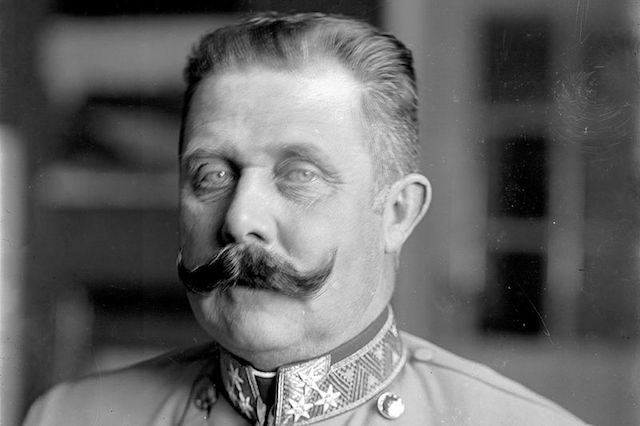
The most-successful terrorist action of all time, Gavrilo Princip’s assassination of Archduke Franz Ferdinand in Sarajevo in June 1914 sparked off WWI, collapsed the Ottoman and Austro-Hungarian Empires, created Yugoslavia which, in turn, created the Yugoslav wars of the 1990s and everything from our understanding of “ethnic cleansing” to the modern states of Serbia, Croatia, and Slovenia (among others).
But Princip’s role in shaping the world was down to sheer fluke. The original attempt on Franz Ferdinand failed, and it’s totally conceivable the Archduke could’ve fled Sarajevo, rather than waiting around awkwardly for Princip to assassinate him. If things had gone down that way, the world right now would be utterly unrecognizable .
In 2014, political scientist Richard Ned Lebow published a book with this exact premise. His conclusions make jaw-dropping reading. Without Sarajevo, you have no WWI. Which means no Germany ready to elect Hitler, which means no WWII. That means no Holocaust, which means no state of Israel or modern Middle East. And that’s just one tiny part of Lebow’s book.
He also suggests the centuries-old Austro-Hungarian Empire would’ve not only continued, it would’ve become a beacon of tolerance due to its multicultural population. Without WWI, the Russian Revolution may not have succeeded, which means no Stalin, no Eastern bloc, and no gulags. It also means the European powers retain global dominance, rather than letting America rise to the top.
8. Carlos II Manages to Sire an Heir
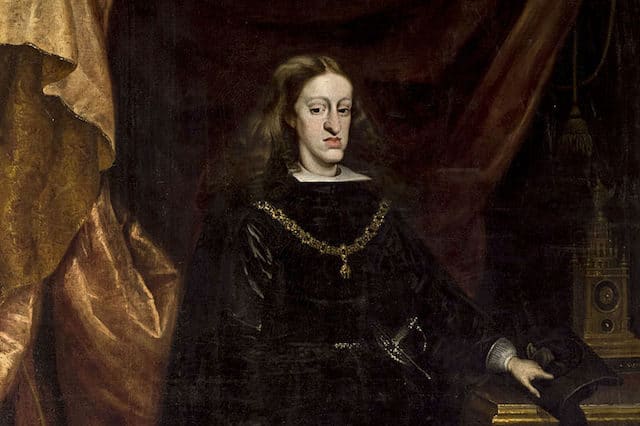
The Spanish War of Succession is likely the reason you’re reading this in English. At the time it all kicked off (1701), Spain and France were the big superpowers in Western Europe, and Britain was relegated merely to “rising star.” The subsequent 13 years of bitter fighting changed all that. It completely knocked Spain out the running, damaged France’s standing, and – most important of all – left Britain as queen bee.
This had all sorts of crazy implications, from the fate of Spanish and British colonies in the New World, to the reach of the Holy Roman Empire. The reason it all happened? Carlos II just couldn’t make his junk work well enough to sire an heir .
At the time, the only acceptable way to become king or queen was to be born to a ruler and inherit the title on their death. You couldn’t just hold a free vote on your next leader or anything dangerously-insane like that. This was a massive problem, as Carlos II was impotent. Years of inbreeding in his family had left him a genetic basket-case. But what if he’d managed to sire, say, a single son who was normal enough to survive into adulthood and rule as a king?
Well, you’d be looking at a completely redrawn map of Europe for starters, plus a much more Spanish-influenced New World. Britain likely wouldn’t have conquered half the world, with the result that English would today be a much less dominant language.
7. Bill Clinton’s Defense Secretary Tells the Truth About Bombing North Korea
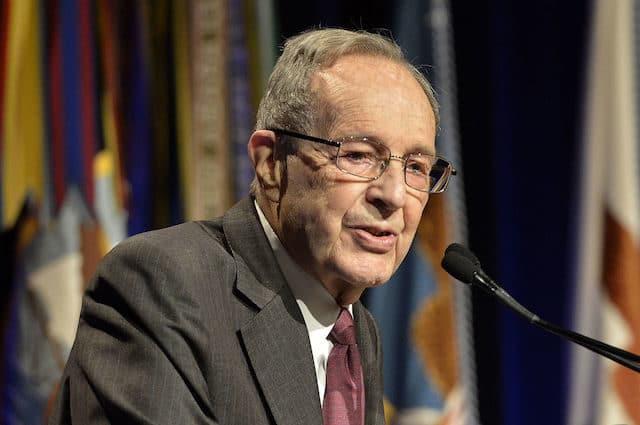
World changing “what ifs?” don’t all have to take place in the distant past. Some can be much, much closer to home.
Such was the case in 1994, when Bill Clinton summoned Secretary of Defense William Perry to brief him on the situation in North Korea . At the time, there were worries about the North’s nuclear program (some things never change, huh?) and the possibility of an attack on South Korea. Clinton wanted to know if the US could successfully take out the North’s reactor at Yongbyon without causing contamination. Perry believed it could. He also believed telling the President that would lead to Clinton authorizing a strike which, in turn, would lead to total war on the Korean peninsula.
So he kept shtum. Yongbyon wasn’t bombed. And modern East Asia was created .
A war on the Korean peninsula was later war gamed by the Pentagon to end in a minimum of a million casualties. 300,000 North Korean shells would’ve levelled South Korea’s capital, Seoul, in a single hour. Nearly as many US servicemen would’ve died as during the Vietnam War. Given the way Vietnam shook up US culture and politics, it’s hard to imagine Korea II doing otherwise.
But the biggest effect would’ve been on Asia. South Korea today is a regional economic powerhouse, not a bombed-out wasteland. China would’ve had to deal with a US force right on its border, possibly leading to conflict. On the other hand, there’d also be no Kim Jong-Un today developing a scary nuclear program.

6. The Romans Win the Battle of Teutoburg Forest
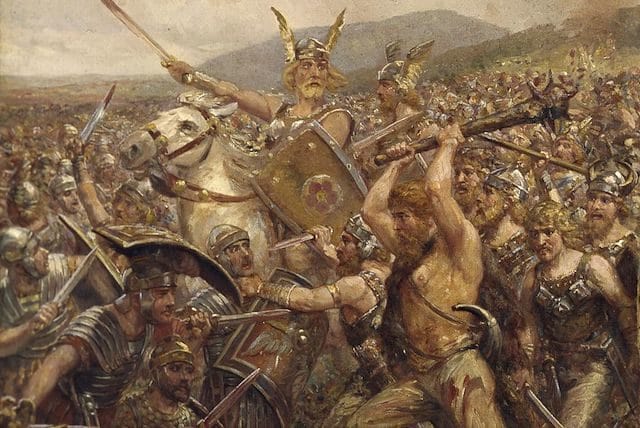
They say a butterfly beating its wings in Ohio can cause a tornado in China (in which case, we’d hate to see what our old frat-buddy’s farts could do. Yeesh ). Well, wait till you hear what a battle you’ve never heard of going the other way in 9 AD could’ve done to the modern world. Had the Romans won the Battle of Teutoburg Forest, the world as you know it simply wouldn’t exist . For one thing, the English language would’ve never evolved.
The Battle of Teutoburg Forest was a hugely significant moment for Rome. After Germanic tribes unexpectedly whupped three of Rome’s mightiest legions, wiping out 10 percent of the entire Roman army, the Empire gave up on conquering Northern Europe. The Empire’s boundaries were set, creating a divide in Europe you can still see today. All that stuff about how southern Europeans (Spanish, Italians, French) have one attitude to life, money and religion, while northern Europeans (Germans, Swedes, Danes) have another? Yeah, that’s Teutoburg talking, right there.
We can’t stress enough how big the implications are. If Rome beat those tribes and went on to conquer much of modern Germany, Germanic languages would cease to exist, which means you’d be reading this in a Romance language. It also means the social divides wouldn’t be there for Martin Luther to get all worked up about in 1517 and turbo-charge the schism between Catholicism and Protestantism. So there’s no 30 Years’ War. The whole Western world would remain Roman Catholic, affecting culture, art and science in unimaginable ways. All because some guys got jumped in a forest over 2,000 years ago.
5. Japan Doesn’t Bomb Pearl Harbor

Let’s get the big, obvious bit out of the way. Yes, an America that doesn’t suffer the trauma of Pearl Harbor still enters WWII. The Japanese were desperately in need of resources when they bombed Hawaii, that was their whole rationale for going toe-to-toe with a much bigger country. The problem was that most of those resources could only be found in US-administered places. Had Pearl Harbor not happened, the US would’ve still gone to war in the Pacific after expansionist Japan eventually invaded the Philippines or Guam or wherever.
The key word here is “eventually.” Prior to Pearl Harbor, the US public didn’t want war. Without the Japanese attack, the tide of opinion wouldn’t have changed. That means no American support for Britain and the USSR against Hitler. And that means trouble.
Sure, by December 1941, the Brits were reasonably sure Germany wouldn’t invade. Sure, Hitler had already made his major mistake of invading Russia by then. In short, the Third Reich was already doomed. But it could’ve gone down in a completely different way.
In this scenario, the Brits are no more than support for the Russian bear as it slowly, inexorably dismantles the Nazi state in a brutal battle of attrition that kills even more than died in the real world. Care to guess what Stalin would do after liberating Europe? Yep, he’d likely take almost the whole lot for himself, creating a scenario where possibly everywhere but Britain eventually falls behind the Iron Curtain. The US, meanwhile, is isolated and no longer seen as the 20 th Century’s moral leader.
4. Napoleon Doesn’t Invade Russia
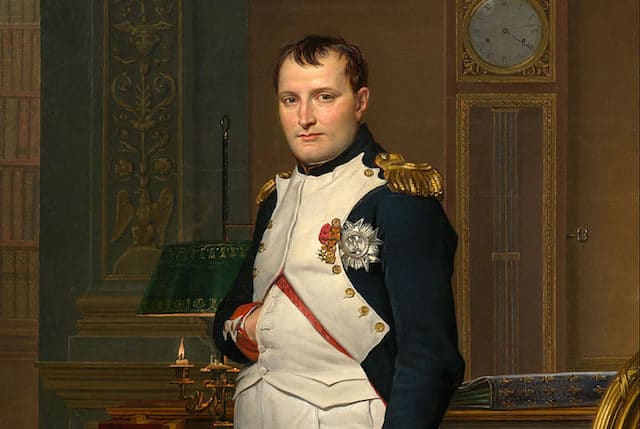
Sticking with megalomaniacs and foolish plans to invade Russia, let’s look at the 19 th Century’s most-foolish megalomaniac of all. Napoleon was the most-feared military commander of his time. By 1812, he’d single-handedly demolished the millennia-old Holy Roman Empire, brought the Austrian Hapsburgs to their knees, completely isolated Britain from all continental trade, and even forced the Russians to do exactly what he wanted them to do. He seemed unstoppable.
And then, in 1812, he made one of the dumbest mistakes a military commander has ever made. After Alexander I broke the trade embargo against Britain, the French general decided to teach him a lesson. He invaded Russia, setting into motion a chain of events that would see his army decimated and humiliated, hundreds of thousands of French soldiers killed, a new European alliance rise up against France, and Napoleon’s ultimate defeat and exile .
Yeah, despite what you hear, it wasn’t the British at Waterloo that took down Napoleon. It was the insane losses the dictator suffered while attacking Russia, a tactic Hitler would revisit over a century later, with similar results. So, no invasion of Russia, and you have an invincible Napoleon who unites the whole of Europe and molds it in his image. The craziest part? This could have easily happened. The decision to invade Russia made no strategic sense, and was only taken to punish Alexander I. Had Napoleon let it slide, or chosen to, say, simply sack a single city in retaliation, the world would be completely different.
3. Rommel Isn’t Absent During D-Day
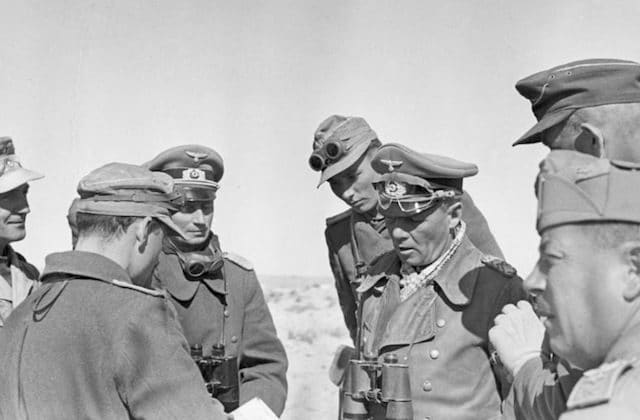
Erwin Rommel was many things: a good strategist, a highly-decorated commander, and one of the most influential people in the Third Reich who wasn’t also a complete scumbag . He should probably also be remembered for taking the worst-timed holiday in history. In 1944, Rommel took time off from his position in occupied France to celebrate his wife’s birthday. The more popular name for that auspicious date today? D-Day.
That’s right. On June 5, 1944, Rommel dashed off to Germany for a quick liaison with his darling wife. Twenty-four hours later, the Allies stormed the beaches, marking the beginning of the end for Nazi domination of Europe. While we can’t know for certain how things would’ve gone if Rommel was there, we do know that the remaining commanders were panicked and confused and completely screwed up the German response. A commander of one of the Panzer divisions later bitterly wrote : “If Rommel had been with us instead of in Germany, he would have disregarded all orders and taken action – of that we are convinced.”
In the spirit of this article, let’s imagine Rommel had been there. Now let’s imagine he mounts a successful defense, and the Allies find themselves experiencing another Dunkirk. What happens next? Well, either Nazi dominance of Europe is ensured for even longer (maybe even giving the Germans time to complete their V3 gun and bomb London flat), or maybe, just maybe, Rommel becomes enough of a German hero to mount a successful coup against Hitler – something he had vaguely discussed before with other officers. So that’s a good ending and a bad ending. Hmm. Which do you find more convincing?
2. Marie Antoinette and Louis XVI Escape the French Revolution

The French Revolution of 1789-99 put a powder keg beneath old Europe and exploded it with the force of a thousand atomic bombs. Old certainties shattered. Conditions fell into place that would see ancient empires swept away. The way we look at the world was fundamentally changed. While it would take some big changes to put the revolution back in its box, it could still have had a completely different outcome. One in which Louis XVI doesn’t go to the guillotine, but instead escapes France to inspire the monarchist forces from abroad .
In June 1791, Louis XVI was on the cusp of fleeing. It had already been arranged for the king to be spirited away from Paris in a light carriage, smuggled across the Belgian border, and delivered into the hands of a royalist alliance. The only reason this didn’t happen? Marie Antoinette insisted on going with him at the last minute. This meant using a slower carriage, which meant they missed an important rendezvous with loyal guards, which led to them being recognized and caught a mere 25 miles from the border. The rest, as they say, is history.
Say they had escaped. It’s not too hard to imagine an exiled king giving the royalist forces a rallying point. At the very least, it’s easy to see Louis sowing discord from exile, putting the ultimate outcome of this turbulent time in doubt.
1. 9/11 is Foiled

9/11 is the most significant event to happen to the USA since Pearl Harbor. The collapse of the Twin Towers and the murder of nearly 3,000 people in NYC, Washington and Pennsylvania effected everyone who was alive to witness it on some deep, fundamental level. The intelligence failings that led to the attack’s success are manifold, and perhaps halting it simply wasn’t possible. But some, like former Clinton and Bush White House staffer Richard Clarke think there was a chance in 2001 of 9/11 being averted . Had that chance been taken, 2017 would look very, very different.
For one thing, Islamist terrorism wouldn’t be nearly the issue it is today. 9/11 not only demonstrated the terrible capabilities of jihadists, it also inspired countless others to set off bombs from Madrid, to London, to Paris. Nor would the biggest Islamist terror group of all be around today: ISIS.
ISIS rose out of the invasion of Iraq, an invasion that was in part sparked by the traumas of 9/11. Without it, Saddam isn’t toppled, the Iraqi government doesn’t collapse, and the revolutionaries don’t ultimately morph into the most reviled terror group in history. Mass surveillance , its powers boosted in the post-9/11 era, also doesn’t become such a huge thing, meaning no Edward Snowden revelations, and no NSA nosing through your every email.
And that’s before we even get into the effect on culture. A world without 9/11 is one where the USA still feels sure of itself, invincible. That would be reflected in all the TV, movies and games surrounding us. In short, it would be a very different place.
Comments are closed.
Type above and press Enter to search. Press Esc to cancel.

IMAGES
VIDEO